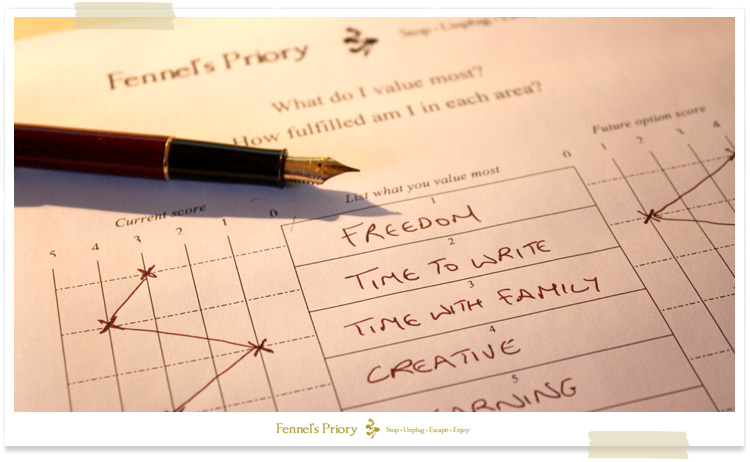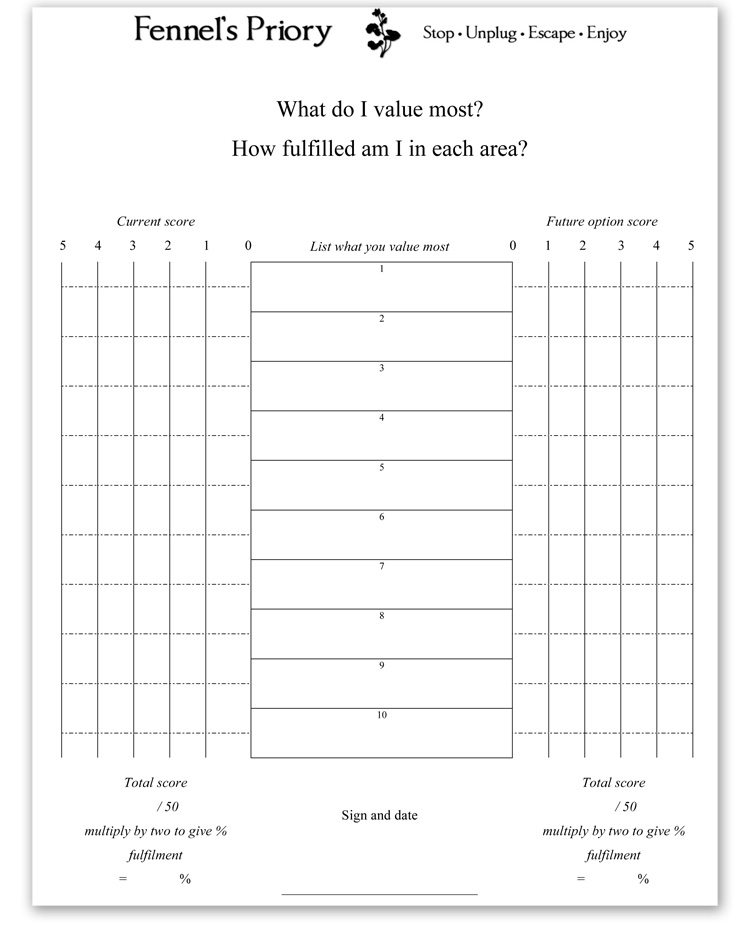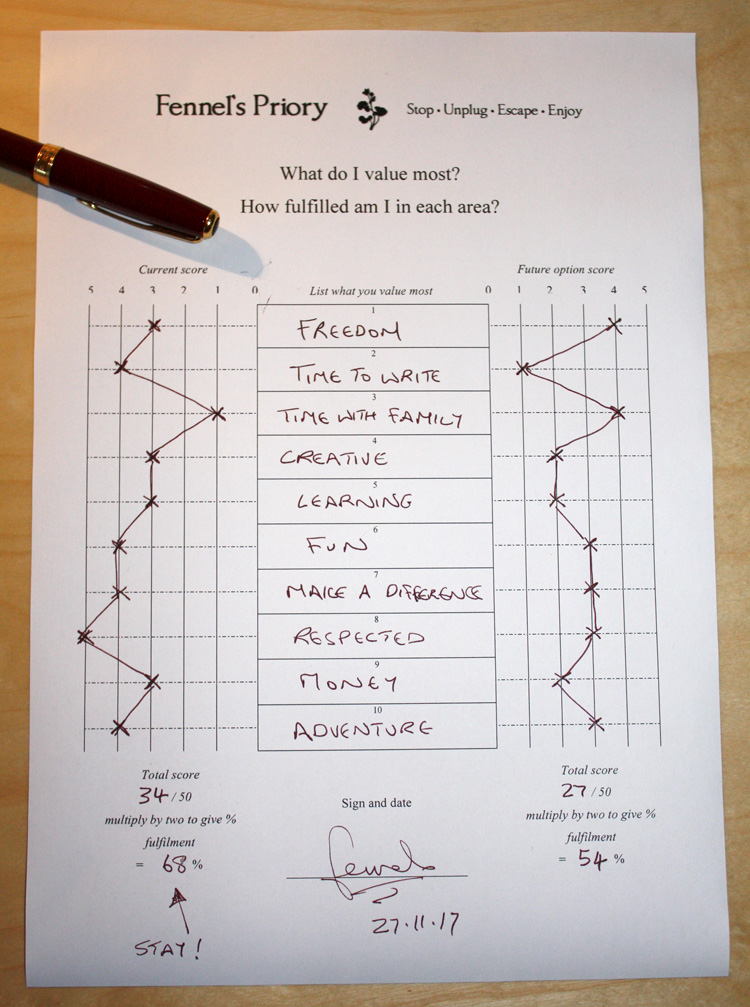
How to Quit, or Survive, the Rat Race
This week I received a letter from a friend working in the city. He wanted 'out', to live a simpler life in the country, but didn't know how to escape. I wrote a long reply, which I have pleasure in sharing here.
Use the value fulfilment tool at the bottom of the blog to calculate how happy you are now versus where you could be.
Dear Friend
Great to hear form you. Your enquiry was well-timed. I’ve just been writing a chapter for my Book of Secrets, which talks in detail about this subject. A summary of the message is this:
If you want to escape, first ask whether it's from a set way of thinking or from something real. Often it's more to do with the story we tell ourselves, and the perception of one's reality it encourages, than from one's current environment.
Outside influence often forces our escape, but the decision always comes from within – driven by a new way of perceiving things. Doing it for ourselves is easy, but less so when others depend on us.
I assume you’ve read my Moonlight Perspective and Tentipi Living blogs? They provide context around what I’m about to say.
Sometimes we're forced to escape, or forced to stay
In 2003 I suffered a breakdown that forced me to reassess my life. I decided to live by a new set of rules, on my terms, but constantly found myself getting sucked into things that weren’t part of my plan. (When you’re so good at something, to the point where an employer’s share price can drop if you and your team don't work your magic, people will offer crazy things to get you to compromise your terms.) I ended up spending nine years travelling all over the world, helping others to make huge amounts of money. It wasn’t what I wanted, and it made me very ill. In 2014 I had a breakdown that was infinitely worse than the first.
Fennel’s Journal was my lifeline. Writing it (from 2006 to present day) was a form of narrative therapy that kept me sane and my readers entertained. It reminded me of who I was and what I believe in. And through it I realised that freedom is a state of mind. Whilst an escape can be physical (location-based) it can also be perceived (which simply requires an adjusted view of one’s situation, to enhance one's perception of reality). It's classic Cognitive Behavioural Therapy stuff. But it relates to the story we tell ourselves.
I recovered my strength and used it to push back on my employer, saying "no" to their demands when they asked me to do another world tour. I got lucky and was given a substantial pay-off. This gave me the financial freedom to escape the madness and potentially spend the rest of my life doing sensible things. It was wonderful. I spent most of 2016 and half of 2017 in leisurely fashion, catching up on Fennel’s Priory projects (rebuilding the website, launching the podcast and Youtube channel, and extending my books).
But then the cash ran out. My family and I had lived beyond our means. It proved that money gives us choice, but frugality provides more choice. I ended up being forced back into work. It was the biggest compromise I'd made in my career.
I’d escaped, but had to go back in.
Staying in for others is hardest
Whilst my wife and daughter expect their luxuries, I’ll happily live to very meagre means – buying things second-hand or making them myself, and patching things up when they start to wear out. It’s fine for me, but definitely not for my family. Which can occasionally make me feel like I’m on a different path, or am selling my soul for others. I end up wanting more space and more freedom. This is when I crave an escape from work or home. But I'll never quit something without good reason, or without consulting others. Ultimately, when emotions subside and I'm thinking clearly, I realise that there's a smarter way.
But I'll never, ever, do anything that offends my soul.
You can get out, while staying in
Getting out is easy. You just quit your job, sell your house, get divorced (if others won’t follow), and go and live the life of a rural tramp. Time and place are yours to enjoy. You are free, you jammy sod. But the world of responsibility and consequence soon catches up. Bills have to be paid and food put upon the table. And, as divorce is rarely a realistic option, you have to do what’s best for others as well as yourself.
So you keep a foot in both camps.
I struggled with the idea of being in and out of the rat race at the same time. That is, until I re-read Elizabeth West’s classic Hovel in the Hills. It’s one of the definitive self-sufficiency books of the 1970s (the other is John Seymour’s Complete Book of Self Sufficiency). It shaped my vision of the ideal life.
Elizabeth West makes it clear that while she and her husband escaped to North Wales and lived the simple life, they still did whatever 'odd jobs' they had to in order to pay their way. In modern terms, they did short-term contract work and then eked out the money for as long as they could before doing some more. That’s what I’m doing now, working my butt off so that I can ease up as soon as my book sales increase.
Understand your 'why'
I encourage you to define the ‘why’ that drives your life purpose and subsequent fulfilment. It will shape the story you tell yourself and the value you see and find in things. Decisions become easier when you know these terms of engagement.
Know your terms of engagement
My terms of engagement for either ‘work' or ‘escape’ mean that everything must support my goal of being a writer and enable me to enjoy quiet times amongst nature. The more self-sufficient a lifestyle the better.
I constantly remind myself of the Fennel's Journal story. It keeps me focused on what’s important: that I’m a writer. It’s what I do.
I write books and articles, copy for marketing campaigns, and proposals for sales teams. I also lead a team that produces these for a large corporate. It’s the bare minimum to earn what’s needed to support my family and give me the time and energy I need to live on my terms. These terms involve escaping to green places as often as possible. Hence why I live in a tipi during the week, spend every evening writing my books, and exist ‘unplugged’ in my free time.
For me, freedom (defined by autonomy and the time to do as I wish) is the most important thing.
A tool to help you define what's important
There's a really useful tool that helps you to understand your terms of engagement. It was taught to me by Alan Fawcett of Infinite Pie. You simply list the things you value, in the order that they come into your head (this bit is important, as you don't want to overthink or edit your list of priorities). Then you plot them onto the chart below, giving each a score out of five for how happy you are in each area.
The left side of the chart is your current environment (would be work, home, or a mixture of both) and the right side is for a specific future option (usually a new job, or house, or partner, etc.). You then join up the dots of your scores to create a map of what's important to you and how your current environment and future option compare. Scoring it in line with what's important helps you to defermine your terms of engagement for any decision, which helps you to calculate the benefit/risk ratio of the change.
Here's the blank template for you to use. If you're thinking of quitting the rat race, ensure each person in your family completes it. Getting the family view is the responsible approach!

Here's one completed by me, showing how it creates a visual map of what's important.

If you want to be thorough, apply a multiplier weighting to each value. (I didn't do it with my scores, but it's worth doing to get the best result.) Multiply your No.1 value score by 10, your No. 2 value score by 9, and so on until your No. 10 value score is multiplied by 1. You'll get a maximum potential score of 275, so divide your result by 2.75 to see your percentage fulfilment.
(My 'current' score, with the weighting applied, is 174 out of 275. That's 63%. Less than the 68% showing in the picture, thus highlighting the importance I attribute to spending time with my family.)
Plenty to think about. What's your list, and how did you score?
Fennel
If you like this blog by Fennel Hudson, then you might his book Nature Escape, Fennel's Journal No. 12 in which he writes about a 24-hour hour escape to a woodland in spring. You might also like to subscribe to Fennel on Friday, where you'll receive a blog, podcast or video sent to you each week.



